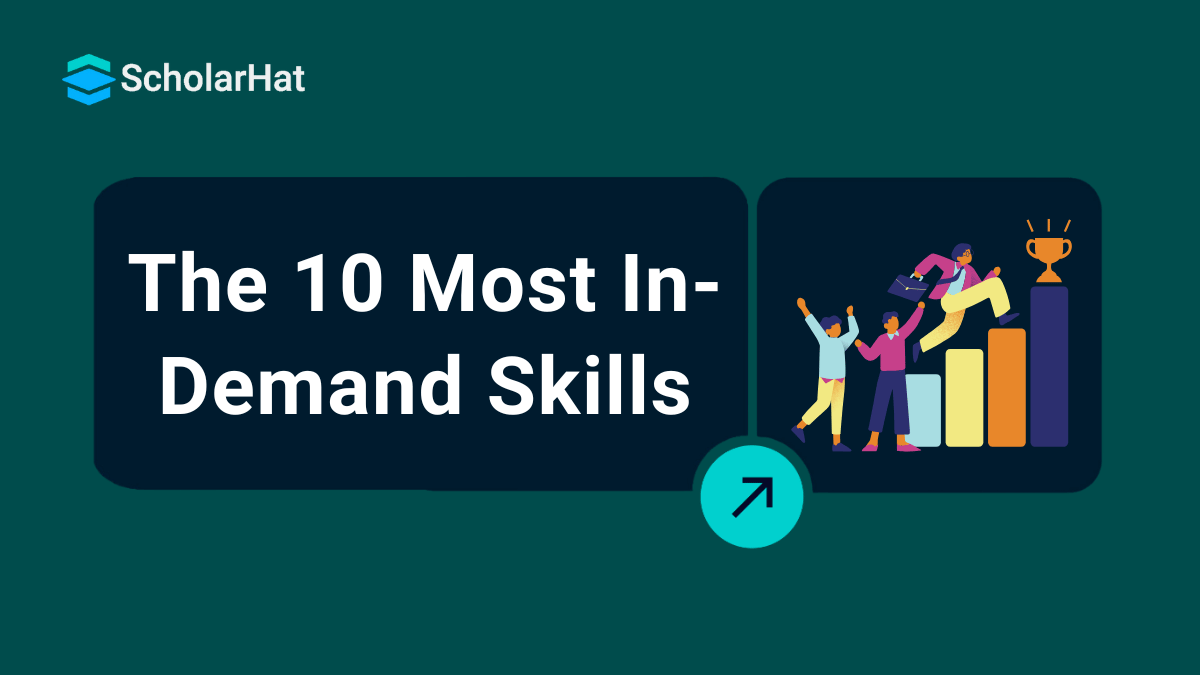13
FebThe 10 Most In-Demand Skills In 2025
Are you thinking about what skills you should learn to get a better job in the future? Many people are asking the same question. Today, the world is changing fast, and companies want people who are ready to learn and grow. To stay ready for the future, we need to understand which are the high demand skills for the next 10 years.
Many industries are using new technologies like AI, automation, and data tools right now. Because of this, companies are not just looking for degrees; they want people with fundamental skills who can solve problems, think creatively, and work with tech. The demand for skilled professionals is growing, and learning the right skills now can give you a significant advantage in the coming years.
In this Career Tutorial, we’ll explore the most demanding skills in the future of 2025 that can help you grow and succeed in your career.
Top 17 High-Demand Skills for the Next 10 Years
These are the most demanding skills in the future that companies across the world are looking for. If you want to grow in your career, these are the best skills to learn in 2025 and beyond to stay ahead in the changing job market.
1. Artificial Intelligence
Artificial intelligence will be one of the most demanding skills in the future. It means teaching machines to think, learn, and make decisions like humans. AI is used in many fields like healthcare, banking, marketing, and even daily apps like voice assistants and chatbots. Learning AI can open doors to exciting careers like AI engineer, machine learning expert, or data scientist. It's one of the best skills to learn in 2025 if you want to work with future technologies.
Why should you learn Artificial Intelligence?
Artificial Intelligence (AI) is one of the best skills to learn in 2025. It is changing the way companies work and creating many new job opportunities for the future.
- Job opportunities: Many companies are hiring people who know AI, so it's easier to find a good job.
- AI is used everywhere: From shopping websites to hospitals, AI is helping many industries work better.
- Helps you earn more: People with AI skills often get higher salaries and better job growth.
- Learn to solve problems: AI helps you think smart and solve real-life problems using data.
- Be part of the future: AI is used in new things like robots and self-driving cars, so learning it keeps you updated with future technology.
Job Opportunities After Learning AI
Artificial Intelligence is one of the high demand skills for the next 10 years, and learning it can lead to many exciting and well-paying career options. Since AI is used in almost every industry, skilled professionals are needed more than ever.
- AI Engineer: Builds innovative systems that learn and make decisions like humans.
- Machine Learning Engineer: Trains machines using data to improve their performance.
- Data Scientist: Uses AI and data to find valuable insights and predict future trends.
- Robotics Engineer: Designs intelligent robots that can work independently.
- AI Researcher: Studies how AI works and finds ways to improve it.
- Business Intelligence Developer: Helps companies make better decisions using AI tools.
Salary
AI professionals often command competitive salaries, with roles such as machine learning engineers earning an average of 12,00,000 to 16,00,000 per year.
2. Full-Stack Development
Full-Stack Development means you can build both the front-end (what users see) and the back-end (how everything works behind the scenes) of a website or web app. A full-stack developer knows how to design web pages, handle user input, connect to databases, and make everything work smoothly together.
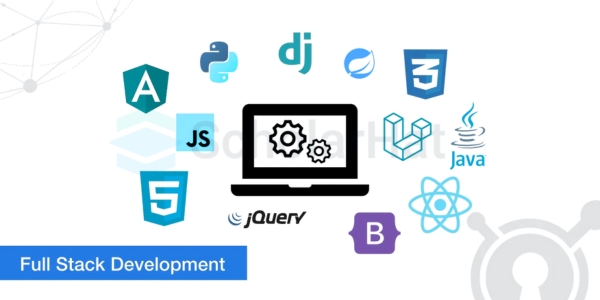
It is one of the high demand skills for the next 10 years because companies prefer hiring people who can do both front-end and back-end tasks. Full-stack developers are needed in almost every tech company, and learning this skill can help you get stable, well-paying jobs.
Why should you learn Full-Stack development?
Full-Stack Development is a powerful skill that allows you to build complete websites and web applications from start to finish. It is one of the skills to learn in 2025 and is becoming a high demand skill for the next 10 years as companies look for multi-skilled professionals.
Job Opportunity After Full-Stack Development
Full-Stack Development is one of the high demand skills for the next 10 years, and companies need developers who can handle both the front-end and back-end of a project. Once you learn this skill, you can apply for many types of jobs in the tech world.
- Full-Stack Developer: Builds complete websites or web apps from start to finish.
- Front-End Developer: Works on the user interface – how the website looks and feels.
- Back-End Developer: Manages the server, database, and how the app works behind the scenes.
- Web Developer: Creates and maintains websites for businesses and startups.
- Software Engineer: Works on bigger software systems that may include web, mobile, and desktop platforms.
- DevOps Engineer: Helps manage code, servers, and software updates smoothly.
- Tech Consultant or Freelancer: Offers web development services to clients or companies independently.
Where to Learn
Educational platforms like ScholarHat, freeCodeCamp, and coding boot camps such as General Assembly provide comprehensive full-stack development courses.
Salary Structure
Full-stack developers salary can expect competitive salaries, ranging from 5,00,000 to 12,00,000 per year, depending on experience and location.
3. Systems and networks
The IT team's main job is to make sure that computer systems and networks run smoothly without any problems. These technical abilities are very useful for jobs in cloud administration and cybersecurity. They are often found in system administrators and network administrators.
These are some of the most important skills to learn in 2025 because they help keep all the technology in a company working well. As companies become more digital, these skills are also considered high demand skills for the next 10 years.
- Managing a variety of operating systems, such as Mac, Linux, and Windows.
- Installing and setting up hardware and software on computers
- Cloud management and software
- Upkeep of virtual private networks (VPNs), storage area networks (SAN), wide area networks (WAN), and local area networks (LAN)
- Troubleshooting
- Assisting staff members with technical problems
Why should you learn system design and networking?
System and network management are becoming some of the most demanding skills in future, especially as companies depend more on technology.
- System Administration: Managing and maintaining computer systems so everything runs smoothly and safely.
- Network Administration: Setting up and managing networks to keep devices connected and data flowing securely.
- Cloud and Security Support: These skills are also useful for cloud services and cybersecurity, which are growing fast in today’s tech world.
Job Opportunities After Learning System and Network Designing
Roles include system administrators, network engineers, and IT support specialists.
- System Administrator: Manages and maintains computer systems, servers, and software to ensure everything works properly.
- Network Engineer: Designs, builds, and manages networks to keep devices connected and data moving safely.
- IT Support Specialist: Helps users solve technical problems like software errors, login issues, or computer setups.
Where to Learn
Certifications from Cisco, CompTIA, and Microsoft are valuable for those pursuing careers in systems and networks.
Salary Structure
Professionals in systems and networks typically earn salaries ranging from 6,00,000 to 10,00,000 per year.
4. Blockchain
Blockchain is a special digital technology that stores data in blocks and connects them like a chain. Once the data is added, it cannot be changed, which makes it very safe and trustworthy. It first became popular through cryptocurrencies like Bitcoin, but now it’s also used in banking, healthcare, voting systems, and supply chains.
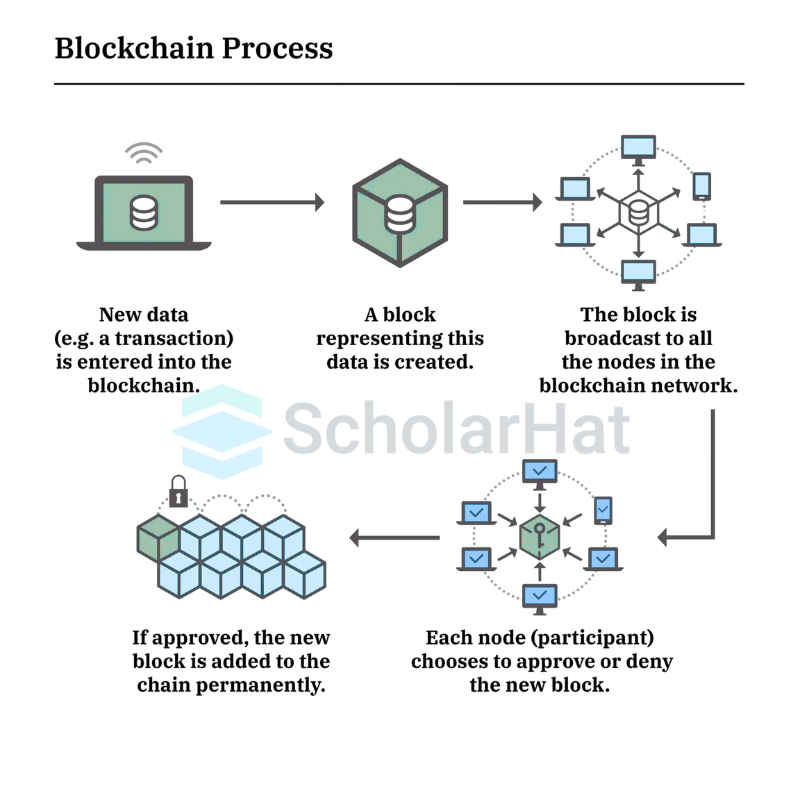
Because of its strong security and growing use in many industries, blockchain is one of the skills to learn in 2025. It is also considered one of the high demand skills for the next 10 years, making it a smart choice for a future-ready career.
Why should you learn Blockchain?
Blockchain technology provides decentralized and secure solutions for various industries, including finance, supply chain, and healthcare. Its potential to transform business processes drives the demand for professionals with blockchain expertise.
Job Opportunities After Learning Blockchain
Blockchain developers, consultants, and solution architects are sought after by companies exploring blockchain applications.
- Blockchain Developer: Builds and writes code for blockchain-based apps and systems, like smart contracts or crypto wallets.
- Blockchain Consultant: Gives advice to companies on how to use blockchain in their business to make it safer and more efficient.
- Solution Architect: Plans and designs the overall structure of blockchain systems so they work smoothly with a company’s needs.
Where to Learn
Online platforms like Blockchain Training Alliance, B9lab, and university programs offer courses in blockchain technology.
Salary
Blockchain professionals can earn salaries ranging from ₹6 to ₹12 lakhs per year. depending on experience and specialization.
5. DevOps
DevOps practices, which focus on better teamwork between development and operations teams, have become very important for fast and smooth software development. These practices help in delivering updates quickly and fixing problems faster. As a result, professionals who know DevOps are in great demand. It is now one of the high demand skills for the next 10 years and is also considered among the most demanding skills in future.
- Knowledge of the continuous delivery theory
- Container technologies, such as Kubernetes or Docker
- Programming languages such as C, Python, and Ruby
- Knowledge of cloud computing
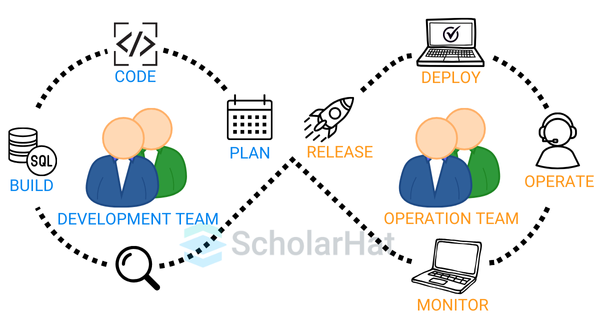
Why should you learn DevOps?
DevOps practices streamline collaboration between development and IT operations. The automation and efficiency improvements brought by DevOps have made it an essential skill in modern software development.
Job Opportunities After Learning DevOps
DevOps engineers play a vital role in ensuring the continuous integration and delivery of software.
- DevOps Engineer: Works on both development and operations to make sure software is built, tested, and delivered quickly and smoothly.
- Release Manager: This person manages the release process by planning, scheduling, and ensuring that new software updates are delivered without problems.
- Automation Architect: Designs tools and systems that automate tasks like testing, building, and deploying software, helping teams save time and reduce errors.
Where to Learn
Platforms like ScholarHat and Docker provide courses and certifications in DevOps practices.
Salary Structure
A DevOps Engineer in India can earn an average salary of ₹6 to ₹15 lakhs per year, depending on experience, skills, and company.
6. Data Analysis
Data has become a new form of currency in today’s digital world, and that’s why data analysis skills are so important. Whether it's understanding large sets of data, spotting trends, or making smart decisions based on numbers, having strong data skills helps professionals support business growth and new ideas.
These abilities are some of the skills to learn in 2025 and are also counted among the high demand skills for the next 10 years, as almost every industry now depends on data to move forward.
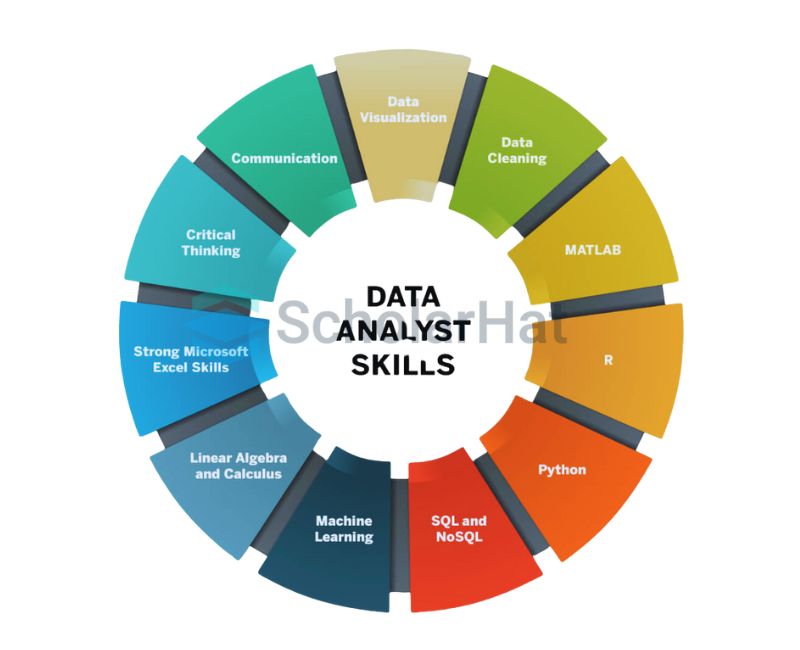
Why should you learn data analyst skills?
In the age of big data, organizations rely on data analysts to extract meaningful insights. The demand for professionals who can interpret and analyze data continues to grow.
- High career demand: Data analysis is one of the top skills to learn in 2025 because every company needs data to make smart decisions.
- Used in every industry: From healthcare to finance, data analysts are needed everywhere.
- Better decision-making: Helps you turn numbers into useful insights for business growth.
- Good salary and job growth: Skilled data analysts often earn good pay and have strong job security.
Job Opportunities After Learning Data Analyst
Data analysts are needed in various sectors, including finance, healthcare, and e-commerce.
- Data Analyst: Looks at data, finds patterns, and creates reports to help companies make better decisions.
- Business Analyst: Understands business problems and uses data to suggest solutions that improve performance.
- Data Scientist: Uses advanced tools and techniques to predict future trends and build data models for deeper insights.
Where to Learn
Data science and analytics courses are offered by institutions like ScholarHat and university programs.
Salary Structure
Data analysts can expect to earn between $70,000 and $100,000 per year, depending on experience and industry.
7. Augmented Reality (AR) and Virtual Reality (VR)
AR and VR are changing how we interact with the digital world. AR adds digital objects to the real world (like filters in your phone camera), while VR creates a fully virtual environment (like virtual games or training simulations). These technologies are being used in education, gaming, healthcare, real estate, and more.

They are among the skills to learn in 2025 and also counted as high-demand skills for the next 10 years, especially as more companies look to use immersive experiences to train staff, engage customers, or offer new services.
Why should you learn AR and VR skills?
Learning AR/VR helps you be part of the future of digital interaction. These skills are growing fast in many industries.
- Creative and exciting field: Great for those who love technology, design, and innovation.
- Used in many industries: From education to gaming to healthcare, AR/VR is growing everywhere.
- Career-ready skills: It’s one of the most exciting skills to learn in 2025 for future-focused jobs.
- Work on real-world projects: Create apps, simulations, and experiences that people can interact with.
Job Opportunities After Learning AR/VR
You can work in tech companies, gaming studios, or even schools and hospitals.
- AR/VR Developer: Builds apps and programs using AR/VR technologies.
- 3D Designer/Artist: Creates models and visual designs for AR/VR experiences.
- Simulation Expert: Designs realistic training environments for industries like aviation or medicine.
Salary Structure
Professionals in AR/VR can earn between $80,000 to $120,000 per year, depending on experience and the industry.
8. Cloud Computing
Cloud computing means using internet-based servers to store and manage data instead of local computers. It helps companies save money, scale faster, and stay secure. Services like Google Cloud, Microsoft Azure, and AWS are widely used today.
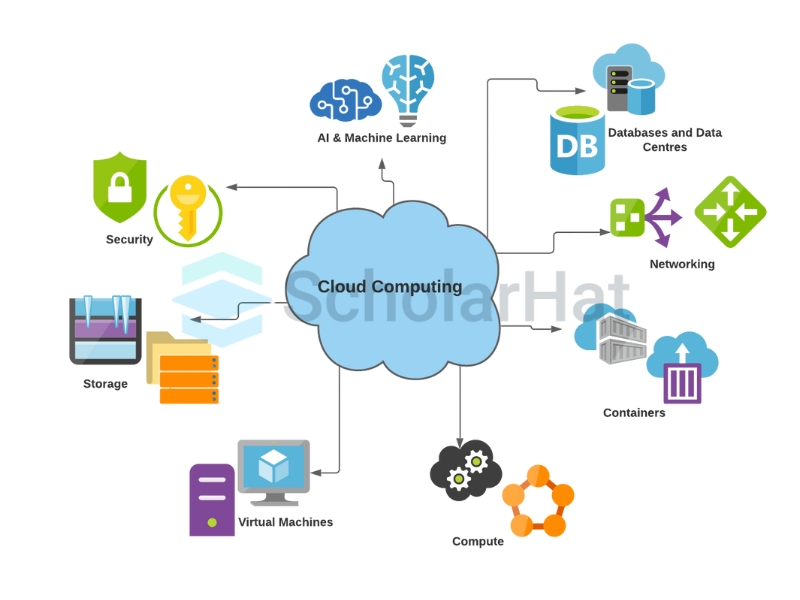
This is one of the most important skills to learn in 2025 and will remain one of the high demand skills for the next 10 years as almost every business moves to the cloud.
Why should you learn cloud computing skills?
Cloud skills open doors to jobs in tech, IT, and cybersecurity.
- Huge demand: Almost all big companies use cloud services, making it one of the skills to learn in 2025.
- Better data security: You help businesses protect their data and work from anywhere.
- Work with top companies: AWS, Google, and Microsoft all hire cloud professionals.
- Good salary: Cloud experts are paid well due to the specialized skills they offer.
Job Opportunities After Learning Cloud Computing
Cloud skills are useful in IT, cybersecurity, web development, and more.
- Cloud Engineer: Designs and manages cloud systems for businesses.
- Cloud Architect: Plans the entire structure of cloud systems.
- DevOps Cloud Engineer: Combines cloud and DevOps to automate and improve systems.
Where to Learn
You can take cloud computing courses on platforms like ScholarHat and other trusted platforms.
Salary Structure
Cloud professionals can earn between $90,000 to $130,000 per year, depending on role and location.
9. Machine Learning
Machine Learning is a part of artificial intelligence where computers learn from data and make decisions without being programmed step-by-step. It is used in things like recommendations (Netflix, YouTube), voice assistants, fraud detection, and more.
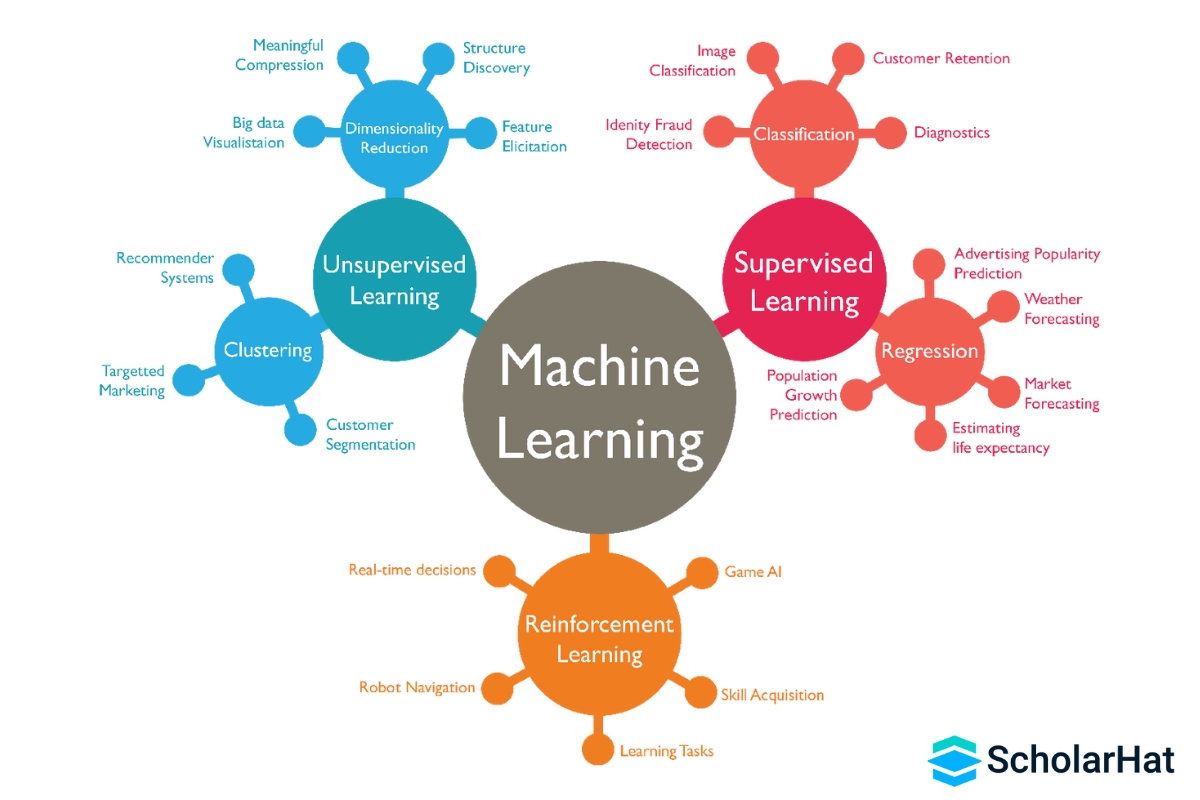
It is one of the smartest skills to learn in 2025 and a high demand skill for the next 10 years, as more companies use data and automation to improve their services and products.
Why should you learn Machine Learning?
Learning machine learning helps you work on smart systems that make decisions, solve problems, and improve with experience.
- Highly in-demand field: It’s a growing part of tech and one of the top skills to learn in 2025.
- Real-world impact: Used in healthcare, finance, marketing, and more.
- Works with big data: Helps businesses understand patterns and make better decisions.
- Great for automation: Helps build smart tools that can learn and improve on their own.
Job Opportunities After Learning Machine Learning
ML experts are needed in companies focused on tech, finance, health, and retail.
- Machine Learning Engineer: Builds systems that can learn from data.
- AI Engineer: Works on advanced smart systems and AI models.
- Data Scientist: Uses ML techniques to analyze and predict from large data sets.
Where to Learn
Learn from courses on ScholarHat and another trusted platform.
Salary Structure
Machine learning professionals earn between $100,000 to $140,000 per year, depending on skills and experience.
10. Cybersecurity
Cybersecurity is the process of protecting computer systems, networks, and data from attacks or unauthorized access. As more businesses move online, keeping data safe is more important than ever.

Cybersecurity is a critical skill to learn in 2025 and will continue to be in high demand for the next 10 years as cyber threats continue to grow in size and complexity.
Why should you learn Cybersecurity?
This skill helps you protect important data and systems, and it's needed in almost every industry.
- High job demand: One of the most needed skills to learn in 2025, with job openings increasing every year.
- Work in many fields: Needed in banking, healthcare, government, and tech companies.
- Helps protect businesses: Stops hackers and keeps systems safe from attacks.
- Great career growth: You can start with small roles and grow into leadership positions.
Job Opportunities After Learning Cybersecurity
Companies across the world are hiring skilled cybersecurity professionals.
- Cybersecurity Analyst: Monitors and defends systems from threats.
- Security Engineer: Builds secure systems and fixes vulnerabilities.
- Ethical Hacker: Tests systems for weaknesses before real hackers can find them.
Where to Learn
Cybersecurity courses are available on platforms like ScholarHat and Google’s Career Certificates.
11. Generative AI
Generative AI is a type of artificial intelligence that can create new content like text, images, music, or even videos. Tools like ChatGPT, DALL·E, and others are great examples of how generative AI can help in writing, designing, coding, and more. It learns patterns from data and then creates something new that looks like it was made by a human.

Generative AI is one of the most exciting skills to learn in 2025 and is considered a high demand skill for the next 10 years. As more companies start using AI tools for content creation, marketing, education, and automation, professionals with generative AI knowledge will be in great demand.
Why should you learn Generative AI?
Learning generative AI can help you work smarter, automate tasks, and explore creative careers.
- Creative and tech together: Combine art, writing, or music with AI technology.
- Big demand in many jobs: Used in content creation, marketing, design, and software.
- Boost productivity: Helps save time by automating repetitive tasks.
- One of the best skills to learn in 2025: Many companies are already using it daily.
Job Opportunities After Learning Generative AI
With generative AI skills, you can work in industries like tech, media, design, education, and more.
- AI Content Creator: Uses AI tools to make articles, images, and videos.
- Prompt Engineer: Writes smart prompts to guide AI tools in generating content.
- AI Product Manager: Manages AI-based tools and builds new features using generative AI.
Where to Learn
Courses on generative AI are available on platforms like Coursera, Udemy, and Google's AI learning resources.
Salary Structure
Professionals with generative AI skills can earn between $90,000 to $140,000 per year, depending on experience and industry.
12. Content Creation and Management
Content creation and management involves making, planning, and organizing digital content like blogs, videos, social media posts, and websites. It also includes managing content strategies so businesses can connect with their audience and grow online.
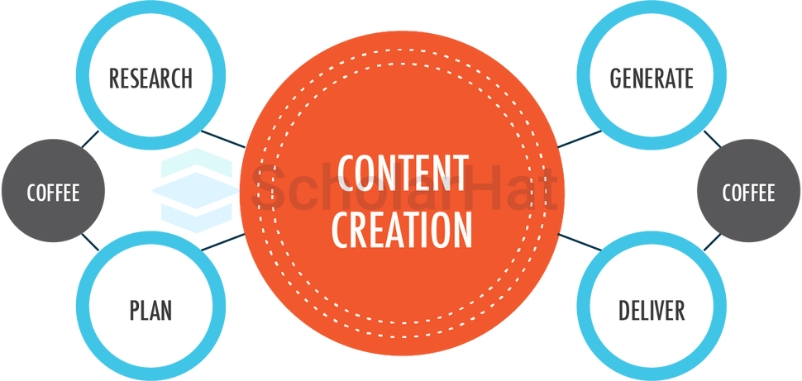
This is one of the essential skills to learn in 2025, as businesses, influencers, and brands need high-quality content to attract and engage customers in the digital world.
Why should you learn Content Creation and Management?
Whether you’re a writer, designer, or marketer, content skills help you grow your personal brand or support any business online.
- In-demand across industries: Every brand needs content to reach people online.
- Flexible and creative career: Work from anywhere and express your ideas.
- Supports digital marketing: A key part of SEO, branding, and social media strategies.
- One of the top skills to learn in 2025: Needed by companies, creators, and entrepreneurs.
Job Opportunities After Learning Content Skills
You can work with companies and agencies or as a freelancer, creating and managing content.
- Content Writer: Creates blog posts, articles, and website content.
- Content Manager: Plans, edits, and organizes digital content for a brand.
- Social Media Manager: Creates posts and strategies to grow followers and engagement.
Salary Structure
Content creators and managers can earn between $50,000 to $90,000 per year, depending on skills, experience, and role.
13. Account Management
Account management is the process of building and maintaining strong relationships with clients or customers. Account managers make sure that customers are happy, their needs are met, and that they continue working with the company. They also help bring more business by offering solutions and support.
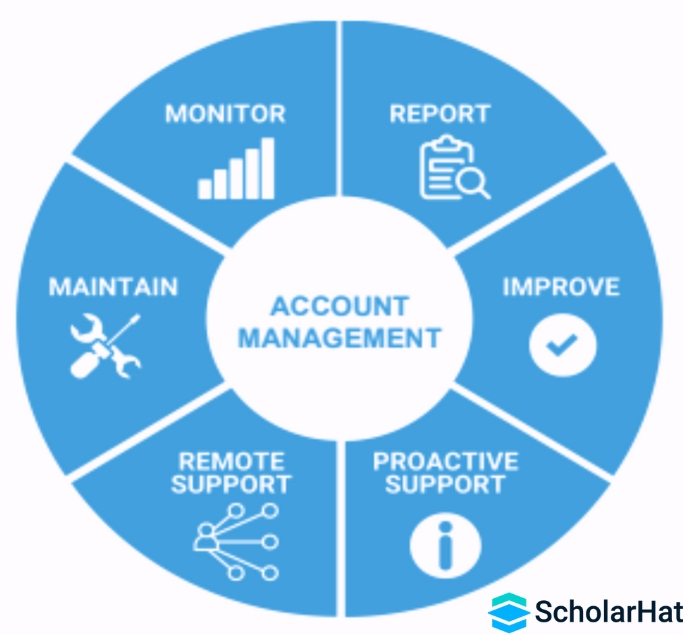
This is one of the important skills to learn in 2025, especially as companies focus more on customer satisfaction and long-term growth. Good account managers are great at communication, solving problems, and understanding what the client needs.
Why should you learn Account Management?
If you enjoy talking to people, solving problems, and helping businesses grow, this role is perfect for you.
- High demand in sales and service industries: Every business needs people who can handle client relationships well.
- Key skill in growing companies: Helps retain customers and grow sales.
- One of the growing skills to learn in 2025: Needed in tech, finance, marketing, and more.
- Builds leadership and communication skills: Great path for future leadership roles.
Job Opportunities After Learning Account Management
- Account Manager: Manages customer relationships and ensures their satisfaction.
- Key Account Manager: Focuses on the company’s most important clients.
- Client Success Manager: Helps clients use the company’s product or service successfully.
Salary Structure
The average salary for account management roles in India ranges from ₹3 to ₹20+ lakhs per year, depending on experience and job level.
14. UX and UI Design
UX (User Experience) and UI (User Interface) Design are all about making websites, apps, and digital products easy and enjoyable to use. While UX focuses on how a product feels and works for the user, UI focuses on how it looks like buttons, colors, and layout.
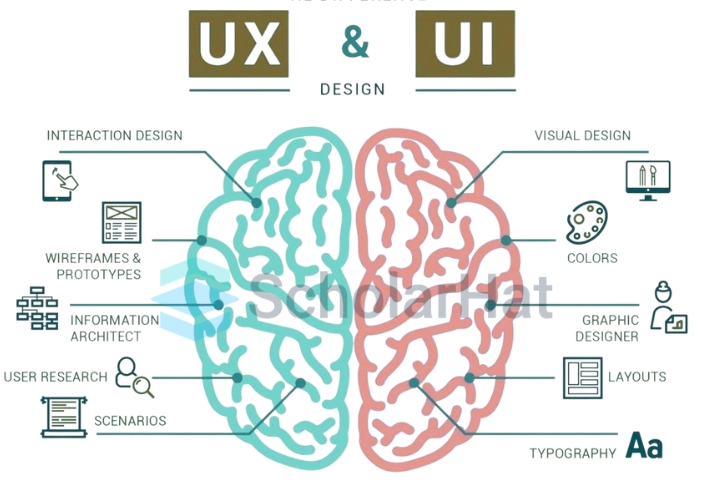
With more businesses moving online, UX and UI are becoming essential skills to learn in 2025. A good design can improve customer satisfaction and increase success for any product or service.
Why should you learn UX and UI Design?
These skills help you make digital products that people love to use.
- Creative and people-focused: You get to design while understanding what users need.
- High demand in tech: Companies want designers to improve user experience on apps and websites.
- Work in different industries: UX/UI is used in healthcare, finance, e-commerce, and more.
- Top design skills to learn in 2025: UX/UI is growing fast in the digital world.
Job Opportunities After Learning UX/UI
UX and UI designers are needed in startups, tech companies, and large brands that value user experience.
- UX Designer: Researches user behavior and designs user-friendly flows.
- UI Designer: Focuses on visual design, layout, and making apps/websites look beautiful.
- Product Designer: Combines both UX and UI to work on the overall product experience.
Where to Learn
You can learn UX/UI design from platforms like Interaction Design Foundation and Google UX Design Certificate.
Salary Structure
The average salary for UX and UI Design roles in India ranges from ₹4 to ₹25+ lakhs per year, based on experience, skills, and company size.
15. Digital Marketing
Digital Marketing is all about promoting products or services using the internet. It includes things like social media marketing, email marketing, search engine optimization (SEO), content marketing, and online ads. The goal is to reach more people online and turn them into customers.
As businesses go more digital, Digital Marketing has become one of the top skills to learn in 2025. Almost every company now needs skilled digital marketers to help them grow online and stay ahead of their competition.
Why should you learn Digital Marketing?
This skill opens doors to many creative and flexible job roles across industries.
- Very high demand: Every company needs online marketing to reach customers.
- Works for all industries: From fashion to tech, every business uses digital marketing.
- Freelance and remote options: You can work from anywhere or start your own agency.
- Top skills to learn in 2025: Digital marketing continues to grow as more business moves online.
Job Opportunities After Learning Digital Marketing
There are many roles you can choose in digital marketing based on your interests.
- SEO Specialist: Improves website ranking on search engines like Google.
- Social Media Manager: Handles brand presence and engagement on platforms like Instagram and Facebook.
- Digital Marketing Manager: Plans and manages all digital campaigns for a company or client.
Where to Learn
You can learn digital marketing from Google Digital Garage and other trusted platforms.
Salary Structure
The average salary for Digital Marketing roles in India ranges from ₹3 to ₹18+ lakhs per year, depending on experience, specialization, and company.
16. Healthcare and Biotechnology
Healthcare and Biotechnology are fields that focus on improving human health and finding better ways to treat diseases. This includes working on medicines, vaccines, medical devices, and using technology like AI in healthcare. It also covers research and innovations to improve how we care for patients.
As technology continues to grow, Healthcare and Biotechnology are becoming some of the most important skills to learn in 2025. With rising health concerns, aging populations, and global pandemics, these fields offer strong career growth and make a real difference in the world.
Why should you learn Healthcare and Biotechnology?
This field combines science, research, and technology to solve real-world health problems.
- Growing industry: The demand for health and biotech professionals is rising every year.
- Make an impact: Your work can help save lives and improve health worldwide.
- Job security: Healthcare jobs are always needed, making it a stable career choice.
- One of the key skills to learn in 2025: Especially with the use of AI, genetics, and new medical research.
Job Opportunities After Learning about Healthcare and Biotechnology
There are many roles you can explore depending on your interest and education level.
- Biotech Researcher: Works on developing new medicines, treatments, or vaccines.
- Clinical Data Analyst: Studies medical data to find better ways to treat patients.
- Healthcare IT Specialist: Uses technology to improve hospitals, health systems, and patient care.
Salary Structure
The average salary in Healthcare and Biotechnology roles in India ranges from ₹3 to ₹25+ lakhs per year, based on the role, experience, and specialization.
17. Renewable Energy and Sustainability
Renewable Energy and Sustainability focus on using clean and natural energy sources like solar, wind, and water to power our lives. It also includes protecting the environment, reducing waste, and saving resources. As the world fights climate change, these areas are growing fast.
These are some of the top skills to learn in 2025 because more companies and countries are investing in green energy. This makes them part of the high demand skills for the next 10 years and also among the most demanding skills in future.
Why should you learn Renewable Energy and Sustainability?
This field offers strong career growth while helping protect the planet.
- Clean energy is the future: The world is shifting to solar, wind, and other renewable sources.
- Good for the environment: Your work can help reduce pollution and global warming.
- More jobs every year: Green careers are rising quickly in every part of the world.
- One of the best skills to learn in 2025: Great for long-term career success and impact.
Job Opportunities After Learning Renewable Energy Skills
- Energy Analyst: Helps businesses save energy and cut costs.
- Environmental Consultant: Advises on eco-friendly practices and sustainable growth.
- Solar Technician: Installs and maintains solar energy systems.
Salary Structure
The average salary in Renewable Energy and Sustainability roles in India ranges from ₹4 to ₹20+ lakhs per year, depending on experience, job role, and organization type.
Why In-Demand Skills Are Your Key to Future Success
Staying updated with the skills to learn in 2025 is the smartest way to grow your career and stay ahead in this fast-changing world. Learning these high demand skills for the next 10 years will open up better job opportunities and keep you future-ready.
1. Adaptability to Technological Advances
Technology is advancing at an unprecedented pace. Professionals who keep up with emerging technologies, such as artificial intelligence, machine learning, and cloud computing, position themselves to adapt seamlessly to changing workplace environments.
2. Enhanced Employability
High demand skills for the next 10 years are wanted by employers in almost every industry. When you keep your skills updated, you become a stronger and more attractive candidate. It helps you match what employers are looking for and makes it easier to get good job opportunities, even in a competitive job market.
3. Increased Productivity and Efficiency
Acquiring new skills often involves learning more efficient ways of performing tasks. This increased efficiency not only benefits the individual but also contributes to organizational productivity. Employers value employees who can bring innovative and streamlined approaches to their work.
4. Future ProofingYour Career
Industries are constantly changing, and some jobs that exist today may evolve or be replaced in the future. By staying ahead with in-demand skills, you will future-proof your career by ensuring you are equipped to handle new challenges and opportunities that may arise.
5. Remain Competitive in the Job Market:
The job market is highly competitive, and employers are seeking candidates with skills that align with the needs of the industry. Regularly updating your skill set ensures that you remain competitive, allowing you to secure new opportunities and advance in your career.
Importance of continuous learning
Continuous learning means always improving your knowledge and skills, even after finishing school or college. In today’s fast-changing world, it’s important to keep learning so you don’t fall behind.
By focusing on the skills to learn in 2025, you stay ready for new jobs and technologies. It also helps you build high demand skills for the next 10 years, which are needed by top companies around the world. This keeps your career strong and full of new opportunities.
Career paths with In-demand skill
In-demand skills like programming languages, cloud computing, and cybersecurity are critical for careers in technology and IT. Roles such as software developers, data scientists, and IT specialists are often at the forefront of technological advancements.
Professionals with expertise in the skills above can explore diverse career paths. Whether working as AI engineers, full-stack developers, cybersecurity analysts, or data scientists, the possibilities are extensive. The demand for these skills spans across various sectors, offering opportunities for both specialization and broad career paths.
Conclusion
In conclusion, learning the right skills is the key to building a strong and future-ready career. The skills to learn in 2025, such as AI, Data Analysis, and Cloud Computing, are becoming more important every year. These are also among the high-demand skills for the next 10 years and are considered the most demanding skills in the future. If you start learning these skills now, you’ll be better prepared for new job roles, higher salaries, and long-term success.

